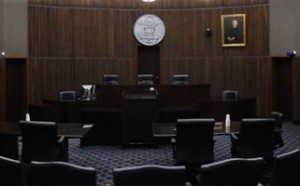 Recently, a colleague queried a local criminal justice listserve for advice on filing a police unreasonable force case in Pennsylvania state court in Philadelphia. I responded with some advice and observations on the pros and cons of filing in the Philadelphia Court of Common Pleas (the First Judicial District or “FJD”), versus seven blocks east in the U.S. District Court for the Eastern District of Pennsylvania. This blog post collects and expands upon our email exchange.
Recently, a colleague queried a local criminal justice listserve for advice on filing a police unreasonable force case in Pennsylvania state court in Philadelphia. I responded with some advice and observations on the pros and cons of filing in the Philadelphia Court of Common Pleas (the First Judicial District or “FJD”), versus seven blocks east in the U.S. District Court for the Eastern District of Pennsylvania. This blog post collects and expands upon our email exchange.
The incident at issue involved allegations that Philadelphia police officers beat a suspect. When their further investigation cleared him of the initial criminal allegations, they left him on the street without arresting him or transporting him for medical treatment. There were officers on the scene who did not participate in the beating, but merely stood by without intervening. The proposed plaintiff suffered bruises, contusions, abrasions and broken teeth. He took himself to the hospital, where he was treated and released. He did not have medical insurance and did not receive follow-up treatment. His injuries have resolved, other than his teeth.
On its face, these facts give rise to claims for federal constitutional violations of unreasonable force((Although the term “excessive force” is often used by practitioners and courts, my friend Paul Messing is a crusader for use of the correct term, which is unreasonable force. Paul points out that not only is “unreasonable” the language of the 4th Amendment, but “excessive” suggests a higher bar for proof of the constitutional violation, which is only whether the officer’s conduct was reasonable under the circumstances. Though I continue to slip on occasion, I subscribe to Paul’s argument.)) under the 4th Amendment to the United States Constitution, and deliberate indifference to serious medical need, under the 4th Amendment and the 14th Amendment.((The law is clear that medical need claims of sentenced prisoners, which include those held on parole or probation violations, arise under the cruel and unusual punishment prohibitions of the 8th Amendment. Likewise, medical need claims of pre-trial detainees who are detained following probable cause hearings, arise under the Due Process Clause of the 14th Amendment. Medical need claims of persons who end up not being arrested, or who are under arrest, but not yet formally charged, probably arise under the reasonable seizure protections of the 4th Amendment. The gray area involves persons who have been charged and incarcerated, but have not yet had a probable cause hearing. To be safe, I advise alleging both 4th and 14th amendment violations for persons denied medical care at any point prior to a probable cause hearing. The distinction is not merely academic. Although many courts apply the same standard for 8th and 14th Amendment denials of medical care claims, there is some suggestion that the protections for a pre-trial detainee may be greater than for a sentenced prisoner. In any event, the reasonableness standard of the 4th Amendment is certainly a lower bar that the deliberate indifference standard of the 8th and 14th Amendments. Of course, all of this is without discussion of issues of qualified immunity, which would require a War and Peace length blog post all its own!)) The facts also give rise to state tort claims for assault and battery.
The vehicle for bringing these constitutional violation claims is the Federal Civil Rights Act (42 U.S.C. § 1983). There is concurrent jurisdiction in state court for federal claims under § 1983, so the federal constitutional claims could be brought in either state or federal court. Likewise, the state tort claims would be supplemental claims (formerly known as pendent claims), over which the federal court has jurisdiction, pursuant to 28 U.S.C. § 1367. However, in Philadelphia, the City Law Department routinely removes state court cases with federal claims to federal court.((The one exception is that the Law Department sometimes will not remove a case with federal claims filed in state court as an arbitration matter, which are capped at $50,000. Civil rights cases are not subject to arbitration in federal court, per local rule.)) The usual question for an attorney contemplating suit, then, is whether to proceed on only state law claims against just the individual officers in state court, or to proceed in federal court on federal constitutional claims and state law claims against the officers and, if warranted, the municipality.
So, if you can bring all of your claims against all possible defendants in federal court, why does all of this matter? The answer is because of different procedural rules, differences in evidentiary rules, different claims and immunities, perceived differences in the judiciary, and differences in the jury pools. I will discuss some of those factors.
 The biggest reason lawyers try to keep their cases in state court in Philadelphia involves the jury pool. In the FJD, the jury pool is drawn from the contiguous confines of the City and County of Philadelphia. Federal juries are drawn from the entirety of the Eastern District of Pennsylvania, which, in addition to Philadelphia, includes the four suburban counties, as well as Berks, Lancaster, Lehigh and Northampton counties. There are certainly fewer minority members in this pool than in Philadelphia. In addition to the lack of racial diversity, the conventional wisdom also holds that federal juries are generally more conservative, and less skeptical of law enforcement.((Although our colleague Jon Feinberg argues that federal jurors look askance at the City, generally, and that this skepticism of Philadelphia includes its police and officials, and trumps their general law enforcement deference)) Federal juries are also considered to be tighter with a buck, even when they find for a plaintiff. Our experience and observation has been that Philadelphia juries are better for police misconduct cases. Like any generalization, there are fact dependent exceptions, and there is no guarantee that any jury panel you ultimately draw, should your matter reach trial, will be more or less favorable.((Also, keep in mind that if a FJD case manager or judge determines that your damages are $50,000 or less, even a case filed in the FJD as a jury demand may be remanded to the arbitration program. Although, either side has a right to a de novo trial before a jury following an arbitration decision, cases on this track receive notably less attention and consideration.))
The biggest reason lawyers try to keep their cases in state court in Philadelphia involves the jury pool. In the FJD, the jury pool is drawn from the contiguous confines of the City and County of Philadelphia. Federal juries are drawn from the entirety of the Eastern District of Pennsylvania, which, in addition to Philadelphia, includes the four suburban counties, as well as Berks, Lancaster, Lehigh and Northampton counties. There are certainly fewer minority members in this pool than in Philadelphia. In addition to the lack of racial diversity, the conventional wisdom also holds that federal juries are generally more conservative, and less skeptical of law enforcement.((Although our colleague Jon Feinberg argues that federal jurors look askance at the City, generally, and that this skepticism of Philadelphia includes its police and officials, and trumps their general law enforcement deference)) Federal juries are also considered to be tighter with a buck, even when they find for a plaintiff. Our experience and observation has been that Philadelphia juries are better for police misconduct cases. Like any generalization, there are fact dependent exceptions, and there is no guarantee that any jury panel you ultimately draw, should your matter reach trial, will be more or less favorable.((Also, keep in mind that if a FJD case manager or judge determines that your damages are $50,000 or less, even a case filed in the FJD as a jury demand may be remanded to the arbitration program. Although, either side has a right to a de novo trial before a jury following an arbitration decision, cases on this track receive notably less attention and consideration.))
State court cases will also probably be on a slower track than those before most federal judges in the Eastern District. If you think the case is settleable, in federal court you would have access to U.S. Magistrate Judges for early settlement conferences. Most of the Magistrate Judges are experienced and knowledgeable when it comes to civil rights cases. But keep in mind that they see the City lawyers all the time and depend on them to come up with money to settle cases, while you may be pretty much a stranger, and certain to be a less frequent visitor.
 As I said, if you file in federal court, your case can include both federal civil rights claims and supplemental state law claims. Additionally, suit in federal court could include the City of Philadelphia as a defendant under a Monell((Monell v. Department of Soc. Svcs., 436 U.S. 658 (1978).)) theory (civil rights violation resulting from a policy, pattern or practice of the municipality).((To further complicate matters, if your defendant is a state trooper, then a Monell claim will not lie against the Commonwealth of Pennsylvania. Will v. Michigan Dept. of State Police, 491 U.S. 58 (1989).)) If your officer has a history of relevant misconduct, your Monell claim against the City for failure to train, investigate or discipline the individual officer (as opposed to broader policy allegations, like failure to adequately investigate or discipline officer use of force, generally), would likely result in your being able to present evidence of that officer’s prior conduct, perhaps just through an expert witness. Such evidence in support of your claim against the City would have the collateral benefit of letting the jury know that the officer is not a choir boy. Unless you can establish a specific exception under Pennsylvania Rule of Evidence 404(b) (motive, opportunity, intent, preparation, plan, knowledge, identity, absence of mistake, or lack of accident), such evidence would probably not be admissible against the officer in state court on a pure state tort case. Also, in the fact pattern described here, there are probably no viable state law claims against the officers who stood by and watched the beating, but there would be a federal civil rights claim for failure to protect, and perhaps one for supervisory liability if any of the bystanders were of higher rank.
As I said, if you file in federal court, your case can include both federal civil rights claims and supplemental state law claims. Additionally, suit in federal court could include the City of Philadelphia as a defendant under a Monell((Monell v. Department of Soc. Svcs., 436 U.S. 658 (1978).)) theory (civil rights violation resulting from a policy, pattern or practice of the municipality).((To further complicate matters, if your defendant is a state trooper, then a Monell claim will not lie against the Commonwealth of Pennsylvania. Will v. Michigan Dept. of State Police, 491 U.S. 58 (1989).)) If your officer has a history of relevant misconduct, your Monell claim against the City for failure to train, investigate or discipline the individual officer (as opposed to broader policy allegations, like failure to adequately investigate or discipline officer use of force, generally), would likely result in your being able to present evidence of that officer’s prior conduct, perhaps just through an expert witness. Such evidence in support of your claim against the City would have the collateral benefit of letting the jury know that the officer is not a choir boy. Unless you can establish a specific exception under Pennsylvania Rule of Evidence 404(b) (motive, opportunity, intent, preparation, plan, knowledge, identity, absence of mistake, or lack of accident), such evidence would probably not be admissible against the officer in state court on a pure state tort case. Also, in the fact pattern described here, there are probably no viable state law claims against the officers who stood by and watched the beating, but there would be a federal civil rights claim for failure to protect, and perhaps one for supervisory liability if any of the bystanders were of higher rank.
If you expect to be removed from state court anyway, filing fee is another reason to file your case in federal court. The federal filing fee is a one time, flat $400, no matter how many plaintiffs or defendants. The Philadelphia fee for a jury demand case with one defendant is nearly $600 ($330 for arbitration/non-jury), with a further $11 for each additional defendant, and every time you file a motion there is a further $52 fee. Of course, if you are willing to spend the extra few dollars and are feeling lucky, you might want to file your case with federal claims in state court anyway, on the very unlikely chance that someone will screw up and miss the deadline for removal of the case to federal court.
Another factor to keep in mind is the immunity provided by the Pennsylvania Tort Claims Act, 42 Pa.C.S.§ 8541, et. seq. This Act provides that City employees, may not be held liable unless their conduct constituted willful misconduct or criminal conduct. Depending on the facts of your case, there is always the possibility that a state court could find the officers liable on the intentional tort claims, but immune due to a lack of willful misconduct or criminal conduct.((Officers can claim qualified immunity from the civil rights claims, meaning that the right in question was not clearly established, or even if clearly established, a reasonable officer would not have understood that he was violating the right. There is no such qualified immunity defense available to individual officers on state law claims, and municipalities do not have qualified immunity from federal civil rights claims)) The further problem under the Act is that the City is not compelled to indemnify an employee if they have engaged in willful misconduct or criminal conduct. So, theoretically, you could win a verdict against the officers, but find that the City will not pay that verdict. If you have not brought and prevailed on a claim against the City, a finding of willful misconduct will leave you going after the officers’ personal resources, which may not prove adequate to pay any judgment. Having said that, however, it has been our experience that the City ordinarily represents and indemnifies its police officers. Generally, the exceptions to this rule are officers who the police department’s own internal disciplinary process have found to have engaged in misconduct, or who have been charged criminally.((The City may also decline to pay the punitive damages portion of a judgment.)) Again, the City will not be a named defendant in state court without federal claims, so any judgment will be against the individual officer.
Just as the jury pool may be the most compelling reason to try to keep a case in the Philadelphia courts, the availability of counsel fees may be the most important reason to bring federal civil rights claims. Exposure to fees is often a powerful inducement to the City in deciding whether to settle a case. The example described above, even after you get an estimate for dental repair, may not represent a large damages case. However, if you prevail, after taking the case through pleadings, discovery, depositions, motion practice, and trial, counsel fees and costs could easily multiply the ultimate judgment several times over.((A wrinkle in the fee calculus is that the City may make you an offer of judgment under F.R.Civ.P. 68 early in the case. Even if you ultimately prevail, if the amount of the verdict, plus fees and costs accrued at the time of the offer, is not greater than the Rule 68 offer, your fees and costs will be capped as of the date of the offer. If you fall short, you will also be liable for your opponent’s costs (but not their fees) accrued after the date of the offer.)) Fees, whether as a prevailing party award or factored into a settlement, benefit both the client and counsel. The decision to give them up must be informed and carefully determined.
 In summary: if you decide to file in state court on state tort claims, only, keep in mind that you are giving up your federal constitutional claims and with them the availability of counsel fees from defendants if you were to prevail on civil rights claims. Also, you are giving up the City of Philadelphia as a defendant, and the opportunity to expose the jury to the officer’s prior history. Finally, when proceeding only on state claims in state court, the potential immunities may result in some or all of your claims being lost, or, even if you win, you may be unable to collect. However, in the right case the advantages of proceeding in state court instead of federal court, may outweigh the disadvantages.
In summary: if you decide to file in state court on state tort claims, only, keep in mind that you are giving up your federal constitutional claims and with them the availability of counsel fees from defendants if you were to prevail on civil rights claims. Also, you are giving up the City of Philadelphia as a defendant, and the opportunity to expose the jury to the officer’s prior history. Finally, when proceeding only on state claims in state court, the potential immunities may result in some or all of your claims being lost, or, even if you win, you may be unable to collect. However, in the right case the advantages of proceeding in state court instead of federal court, may outweigh the disadvantages.
Whichever way you decide to proceed – just state law claims, or federal civil rights claims and state law claims – be sure that your client is fully informed and makes the final decision. Prior to filing suit in state court, my practice is to reduce the pros and cons to writing, clearly setting forth that which the client may be risking or sacrificing by choosing to proceed on state law claims only. Then I review it with my client, answer any questions, and have him/her sign to acknowledge his/her understanding and consent to filing in state court.
Whether in state or federal court, police misconduct civil rights litigation can be complex, fraught with many tiger pits filled with stakes waiting to impale you. My recommendation is to start with a modest, uncomplicated case of direct liability against an officer, without complicated theories of liability or difficult to prove damages. If you stumble upon a significant, complex case, consider referring it, or consulting or associating with an experienced civil rights litigator. In any event, be sure to vet your case carefully and be thorough in your research and investigation. Remember, there is nothing wrong with a little healthy skepticism to help make sure you are not missing flaws in your case.
And whether a newbie or a pro to this area of the law, an indispensable tool is Police Misconduct: Law and Litigation, 3d, 2014-2015 ed., by Michael Avery, David Rudovsky, et al. My well-thumbed copy of this resource is always close at hand. If you are defending a criminal case that might result in a civil suit, get a copy of the PBI publication, Police Misconduct: Defending Criminal Cases in Pennsylvania, 2nd Edition, 2013, by Paul Messing.
Good luck.





